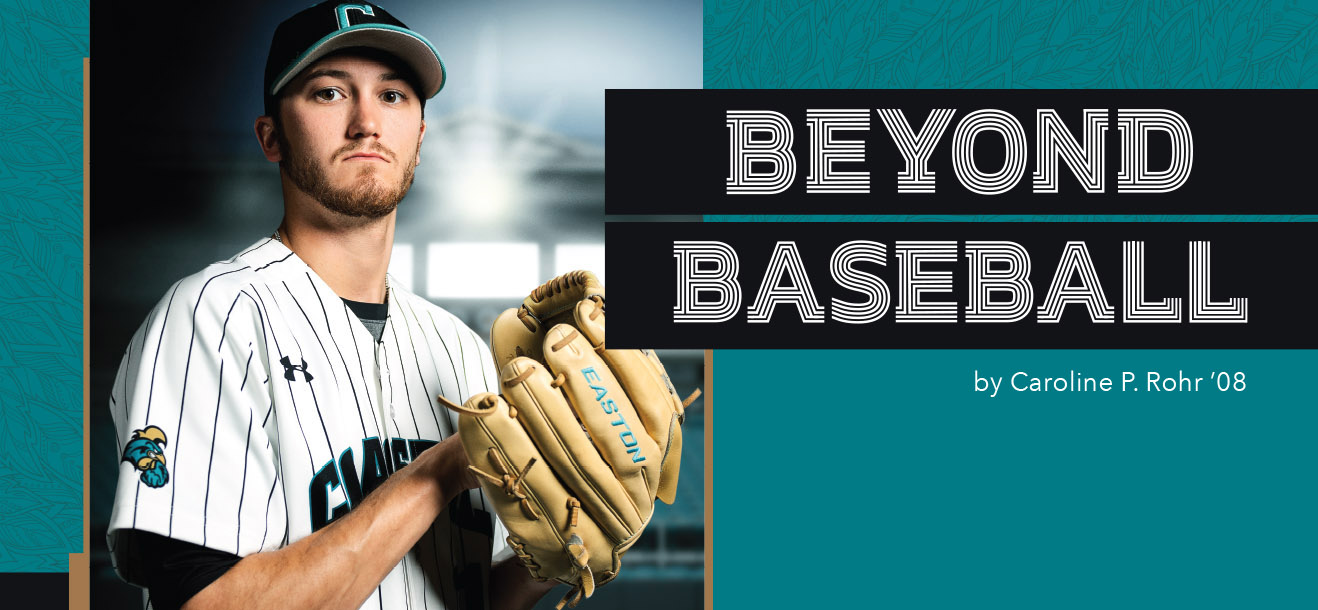
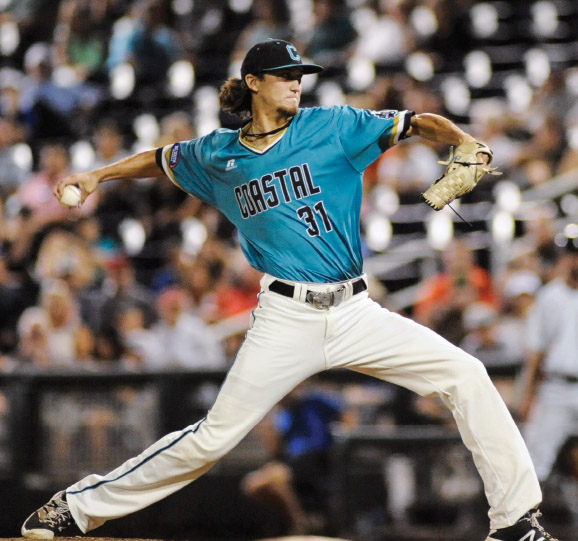
Selfless. Relentless.
Those two words have become the essence of the Coastal Carolina University baseball team, embraced by players, coaches and staff alike. But perhaps nobody embodies those two words more than No. 31, Bobby Holmes. All agree that Bobby is the epitome of Coastal Baseball. He built his legacy at Coastal over a span of five years that included major highs—winning the University’s first national championship in 2016—and major lows—Tommy John surgery and sitting out the entire 2018 season. It was a legacy sealed even before he walked on to the pitcher’s mound to begin his final season.
Something about the way Bobby Holmes walked off the pitcher’s mound during a high school tournament caught pitching coach Drew Thomas’ attention. Holmes wasn’t pitching well at first, giving up nine or 10 hits through the first three innings. All the other recruiters left. Thomas didn’t.
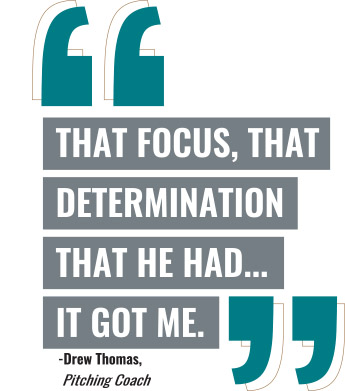
“That focus, that determination that he had...It got me,” Thomas remembered. “His will, you could see it when he walked off the mound. He wasn’t happy about his performance, but he didn’t lose control. The breaking ball got better as he went, and he just got better and better. He is the first player I’ve ever recruited who gave up nine to 10 hits in three innings.”
After that performance, Thomas sent head coach Gary Gilmore down to Atlanta to take a look at Holmes. Gilmore said it was an easy decision to offer him a spot on the roster.
“His ability was outstanding,” Gilmore said. “But what some people don’t realize is that here at Coastal you have to be a little different. You can’t just be talented, you have to play with a chip on your shoulder. His natural abilities showed, but the way he walked out to the mound, you could tell he was a competitor, that he was going to find a way to be successful.”
People sitting around Gilmore in the stands that summer day sealed the deal, telling him that Holmes was one of the best-liked players on the team and that he was a good kid who earned good grades. Gilmore did have one reservation about his new recruit.
“I told him he needed to get his hair cut!” Gilmore laughed. “He was this long, wiry guy with hair halfway down his back.”
Holmes came to Coastal on scholarship the following year, 2014, but it would be a few more years before he’d cut his hair.
When Holmes signed with Coastal Carolina as a senior at Oconee County High School, he knew he was coming to a university where baseball was a big deal, and one that would be a home away from home for him.
“I didn’t want to go to a big school,” he said. “I like the smaller classrooms here and how the professors knew my name. I felt like family here right away.”
Family is just as important to Holmes as baseball. His mother is his best friend and biggest supporter, and he’d be the first to tell you that he wouldn’t be where he is today if it wasn’t for Katie Towns.
“She’s been my best friend relationship for so long,” he said. “She’d give up the whole world for me to make sure I could keep chasing this dream and to keep playing as long as I can.”
Towns is a schoolteacher in Watkinsville, Ga., where Holmes grew up, and several other relatives are teachers, too. Holmes originally thought he’d go into teaching, even starting his career at CCU as a special education major.
Children flock to him as if he is a magnet, but he says it’s only because he is a big kid himself. Towns said it’s always been like that, recalling an experience Holmes had in high school with an adaptive physical education program for disabled children that he volunteered with for several semesters.
“The students, teachers and coaches adored him,” she said. “His senior year of high school, the teachers arranged a pep rally for the entire student body to honor Bobby as their ‘hero.’”
That’s why when the CCU team is asked to volunteer for Miracle League—a baseball program for children with disabilities—or to read to local kindergartners, Holmes is always there. He even babysits for his coaches.
“It’s just a switch I can flip around kids,” he said. “I just turn into a big, goofy kid who likes to have as much fun as they have. I know what they’re going through, and I want them to have the best experience they can have.”
When it came time to officially enter the education program, his baseball schedule made it difficult to fulfill the requirements of the major.
Working with Agatha O’Brien Gayes, his academic adviser, Holmes changed his major to interdisciplinary studies and built a degree around environmental management in what is now the HTC Honors College and Center for Interdisciplinary Studies.
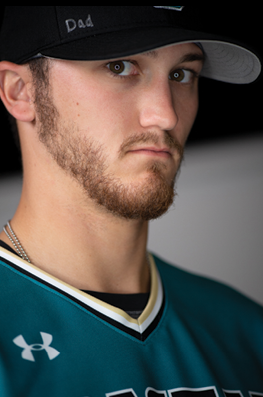
Meanwhile, his freshman year on the team laid the foundation for what was to come. He posted a 4-1 record in 27 appearances with four saves and a 2.9 ERA, solidifying his position as the team’s top relief pitcher. He was named the 2015 Big South Freshman of the Year and was second team All-Big South.
The turning point for him that year was what fellow closer Mike Morrison called “a cold night against Clemson in front of one of the biggest crowds we’d ever seen at a Coastal game,” during which Holmes pitched 4.1 innings for the save, only allowing two hits and one run, walking zero and throwing six strikeouts.
“He went out there and was lights out,” Morrison said. “That game was a huge turning point and a night where a star was born.”
Thomas agrees. “He was pretty much locked in as the closer from that point,” he said. “He struggled some that first year, but he never quit. What makes him stand out is his maturity and his competitiveness. He holds himself accountable, and that shows up when he’s on the mound.”
While much of that comes from his upbringing and background, Holmes gives Morrison much of the credit.
“When I got here, I realized how much I didn’t know about baseball and about how to compete,” Holmes admits. “Mike changed that really quick for me. He taught me all the things I needed to know, not just about baseball, but about being a good person.”
The two bonded quickly over their similar backgrounds and competitive natures, though Morrison said there was never a conflict between the two of them as closing pitchers.
“Bobby and I played catch a few times when he first got to CCU, and I reported back to the coaches that he was going to be something special,” Morrison said. “We both wanted to pitch at the end of the game, but the love and want for each other to be successful helped us become one of the most dynamic duos out of the Coastal bullpen.”
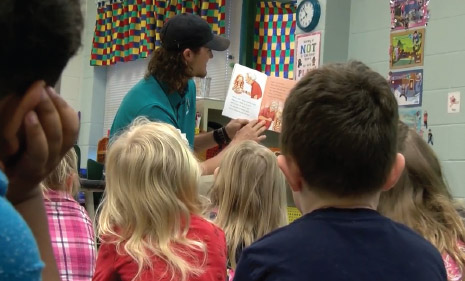
Mentor-athlete: Bobby Holmes reads to elementary school students.
Morrison encouraged Holmes to go above and beyond, to do certain things not because they had to, but because they were the right things to do. They would pick up trash on the way to class, and one day they saw the tennis courts by the baseball stadium littered with tennis balls. They went in and picked up every single one.
Gilmore also noticed his propensity to go the extra mile. The baseball team buys gifts every holiday season for local children in need, and every year, he said, Bobby Holmes leads that initiative. He takes the players to Walmart and gets all the gifts on the lists, and one year he wrapped all the gifts himself.
“Every single present,” Gilmore said. “Took him two days. But that’s just who he is.”

Lucky Monkey: Bobby Holmes and Rafiki were inseparable during the College World Series.
It’s always been about sports and competition for Holmes, which he comes by honestly. His father was “all baseball all the time,” and his brothers played baseball, too. Towns describes herself and her son both as fierce competitors and perfectionists, traits they inherited from her grandfather, a gold medalist in the 110-meter high hurdles at the 1936 Berlin Olympics. Whenever Holmes spent time at his dad’s house, they were always doing something with a ball that involved a competition of some sort.
“We’d play this game called ‘bullet,’ where dad would put me in front of the bushes and throw a football at me as hard as he could, and I’d have to catch it,” Holmes said. “When we’d play basketball when I was 7, 8, 9 years old, he’s really trying to beat me, not taking it easy on me. Everything was always a competition.”
Holmes played basketball and golf until he was 14, when he had to make a choice about which sport he was going to focus on. It was an easy choice, and he hasn’t looked back. Plain and simple: He loves baseball, and it’s his dream to play it as long as he can.
He doesn’t take it for granted, though. He knows even if baseball turns into a career, eventually it will end. His approach to the game is one day at a time, don’t stop competing, and have fun and be happy no matter what.
“I just like having a good time,” he said simply. “I want to make the most of my time. You only get so much time in the day, so you might as well be happy.”

It’s that perspective and joie de vivre – evident from the wide, toothy smile – that drew fans to him during the team’s 2016 National Championship run. He became an instant sensation in Omaha and throughout Teal Nation, due equally to his personality, his talent and a stuffed monkey named Rafiki.
Having established himself as a reliable closer his freshman year, Holmes played an important role during the championship season. After the team got swept by Georgia Tech midway through the season, Holmes bought an oversized stuffed monkey at a gas station and walked around with it on his back in an attempt to cheer everyone up. The next weekend when the team played Liberty, the monkey went with them.
“We beat Liberty that weekend and had an amazing weekend,” Holmes recalled. “After that, the monkey was in the dugout with us every game. Eventually, he had a name, clothes, a media pass, a locker. It was a turnaround for us, and Rafiki was in the middle of all that.”
The team went on to beat N.C. State in the regionals, then faced their toughest opponent yet in LSU at Alex Box Stadium for the super regionals. If they won, they’d go to Omaha for the first time in team history.
They won the first game, 11-8, but the second game, Holmes remembers, “got a little hairy.”
The game was tied up at the top of the ninth, 3-3, with the bases loaded and one out. Coach Gilmore called in his closer, Bobby Holmes.
Whenever the opposing team calls the bullpen, LSU’s tradition is to play Garth Brooks’ “Callin’ Baton Rouge” as a way to intimidate the incoming pitcher and get the crowd riled up. It may have worked for the crowd, but it didn’t rattle Holmes.
“That was my song in high school because it was my dad’s walk-up song,” Holmes recalled, smiling but with tears in his eyes. “It’s supposed to be this big intimidating thing for LSU, but I ran out there just thinking about how happy my dad would be to see me there, and how my whole family was there watching.”
Holmes struck out one batter and got the last one to fly out. The offense took over from there, scoring one run in the bottom of the ninth to win it, 4-3. The rest is history: The team went on to beat Florida, Texas Tech, TCU and ultimately Arizona to win it all.
The LSU game is sophomore right-handed pitcher Zach McCambley’s first memory of Bobby Holmes. McCambley was a rising senior in high school at the time.
“LSU was one of the biggest games during that whole run, and I just remember the poise he had on the mound,” McCambley shared. “I remember the confidence in his eyes. There were 20,000 people screaming at him, but nothing phased him.”
Holmes says he doesn’t know if he will ever get to do something like that again, but what impacted him the most during that championship run wasn’t the baseball. It was his mom. “My mom was there for every game, even though she couldn’t afford it,” he said. “She didn’t go home for a month and a half, and my whole family came out [to Omaha] in rotations to be there. After every game, my mom is the first person I wanted to see.”
“She has worked very hard to do things for Bobby, to allow him to have a great experience in life,” Gilmore said. “His morals and the things he believes in, his drive to do well both on the field and in the classroom, that’s a testament to her.”
Expectations were high for the team following the championship year, but Holmes still took things one day at a time, on and off the field. He continued to excel in the classroom, having had the highest GPA on the team the previous year and continually earning recognition on the dean’s list or president’s list. On the mound, he was 5-3 with three saves and a 2.51 ERA until adversity struck in the middle of the season.
Holmes injured his throwing arm and elected to have Tommy John surgery in May 2017. He missed the entire 2018 season so he could rehabilitate and make a full recovery.
It’s a long road back to restore the elbow’s full range of motion, strength and power, even if rehab goes according to plan.
“To start a season as a top prospect and then have a significant injury…most guys, it devastates them,” Gilmore said. “For him, yes, it was a setback, but he’s been positive throughout. He put everything aside for the team, and he really was like having another full-time coach.”
Not only did he dedicate himself to his own recovery, he was a relentless team leader. Holmes was in the dugout for every home game, keeping pitching charts, cheering on the team, leading warmups, and encouraging players.
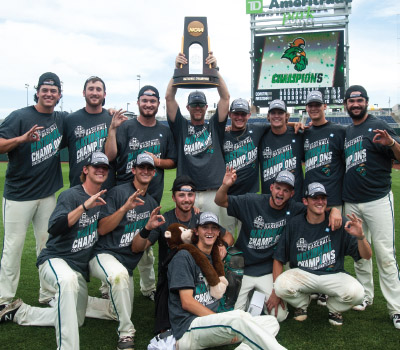
Great Victory: Holmes shares the glory with his teammates after winning the 2016 College World Series.
“Him being on the road with us really helped us grow as pitchers,” said McCambley. “He put everyone before himself. He showed us that if you just keep going and don’t stop, your time comes back around.”
Thomas said what helps Holmes stay positive is how comfortable he is with himself. He is able to be the same person every day because he knows who he is, and he is aware of the presence he has, but he doesn’t abuse it.
“People look up to him,” senior outfielder Kieton Rivers said. “He’s one of the tougher people I know, and he became a mentor and role model for all of us. He makes me want to be like the kind of person he is.”
Holmes admits the injury did take a toll on him, in the same breath saying it’s the best thing that could have happened to him.
“I learned a lot about how to take care of myself the right way,” he said. “I fell in love with baseball and CCU all over again, and I feel like I really grew up and figured out how to be a man. It’s weird that a scar on your arm can do that, but it has.”
He cut his long hair off, and talks now about the poetry of baseball, of its unspoken side. “It’s not X’s and O’s…there are so many ins and outs to the entire game, not just pitch calling. It’s so much more than just throwing the baseball; it’s a cat and mouse game.”
Holmes’ dedication off the field has rubbed off on a lot of the players, and that’s evident by the team’s collective GPA, which is almost always above 3.0. But more than that, he’s shown them how to be professional, manage their time and how to behave in public settings.
“He’s taught us how to be gentlemen and represent the program,” senior pitcher Austin Kitchen said. “He always leads us in the right direction, telling us we won’t succeed on the field if we don’t perform well in the classroom.”
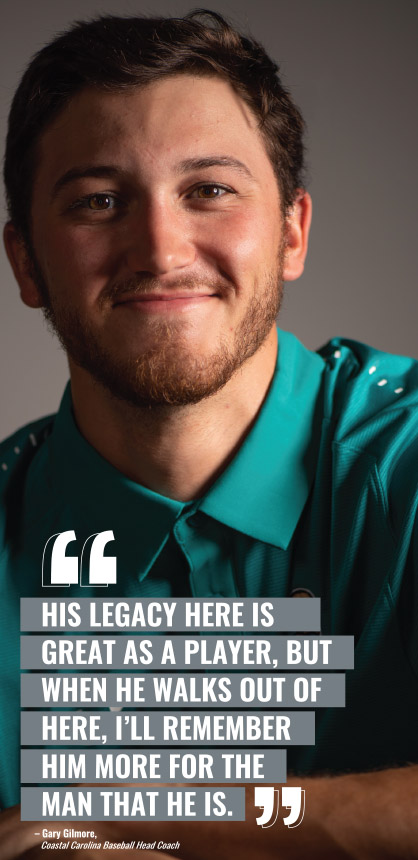 Holmes graduated cum laude at the end of the 2018 season, and with a year of eligibility left, he entered the MBA program, which he is on track to complete by Summer 2019. In late March, he was tabbed as a 2019 Senior CLASS Award candidate, one of only 30 such players in the nation. CLASS is an acronym for “Celebrating Loyalty and Achievements for Staying in School.”
Holmes graduated cum laude at the end of the 2018 season, and with a year of eligibility left, he entered the MBA program, which he is on track to complete by Summer 2019. In late March, he was tabbed as a 2019 Senior CLASS Award candidate, one of only 30 such players in the nation. CLASS is an acronym for “Celebrating Loyalty and Achievements for Staying in School.”
He doesn’t have firm plans for what happens next, and it doesn’t seem to bother him. He’d like to keep playing ball, but even if he did, he said, eventually that would come to an end. His degrees have prepared him for a career in environmental project management or construction management, but until then, he’s going to keep taking it one day at a time. “You can’t look too far in advance, especially about things you can’t control,” he said. “I’ll take it one pitch at a time.”
Coaches and teammates aren’t too comfortable talking about what Coastal Baseball will be like without Bobby Holmes. Players know already that someone will have to step up into shoes that are too big to fill.
“If I had enough guys like him, I might could die in the third-base coaching box, because where else in the world would I rather be?” Gilmore said. “He’s one of the most all-time respected players we’ve had here. He is one of two of the most selfless players I’ve ever coached. His legacy here is great as a player, but when he walks out of here, I’ll remember him more for the man that he is.”


